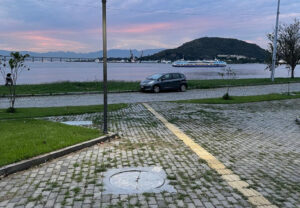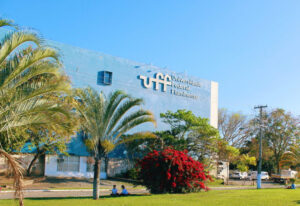AoIR2025 Niterói, Rio de Janeiro, Brazil
15-18 October 2025
The AoIR2025 conference was held in Niterói, Rio de Janeiro, Brazil. It was be hosted by the Universidade Federal Fluminense (UFF).
The conference was held on the Campus Gragoatá, in Niterói, a 13-minute drive from the famous city of Rio de Janeiro, taking the Rio-Niterói bridge. The main building in which the event will take place has just been inaugurated and offers accessible rooms with air conditioning, sound system and internet connection. Niterói, located just across the Guanabara Bay from Rio de Janeiro, also offers a variety of attractions. Some key points of interest are Niterói Contemporary Art Museum (MAC), designed by architect Oscar Niemeyer, and Icarai Beach (both a 15-min walk from the campus).
taking the Rio-Niterói bridge. The main building in which the event will take place has just been inaugurated and offers accessible rooms with air conditioning, sound system and internet connection. Niterói, located just across the Guanabara Bay from Rio de Janeiro, also offers a variety of attractions. Some key points of interest are Niterói Contemporary Art Museum (MAC), designed by architect Oscar Niemeyer, and Icarai Beach (both a 15-min walk from the campus).
Our campus is surrounded by the Guanabara Bay and offers a beautiful view of Rio de Janeiro. It is accessible via car, bus and ferry. The journey from the international airport Antonio Jobim (Galeão) in Rio de Janeiro to UFF takes about 50 minutes. Galeão Airport provides regular flights to other major Brazilian cities, such as São Paulo, Salvador, Recife and many others.
Rio de Janeiro, often referred to simply as Rio, is a vibrant metropolis located on the southeastern coast of Brazil. Renowned for its stunning natural landscapes, rich cultural heritage, and significant historical landmarks, Rio serves as a prominent destination for those interested in a multicultural and warm environment. Rio is home to iconic attractions like Christ the Redeemer, Sugarloaf Mountain, and Copacabana Beach. Beyond these famous landmarks, the city is also celebrated for its delicious cuisine, vibrant culture, and rich history.
About the hosts
The Fluminense Federal University (UFF), located in Niterói, Brazil, is a prominent public institution renowned for its academic excellence and research contributions. Established in 1960, UFF offers a diverse range of undergraduate and graduate programs across various fields, including humanities, sciences, and engineering. The university is known for its vibrant campus life, rich cultural heritage, and commitment to social inclusion, making it a significant educational hub in the region. UFF’s faculty and students engage in innovative research and community outreach, fostering a strong connection with local and global communities.
AoIR2025 Original Call for Proposals




